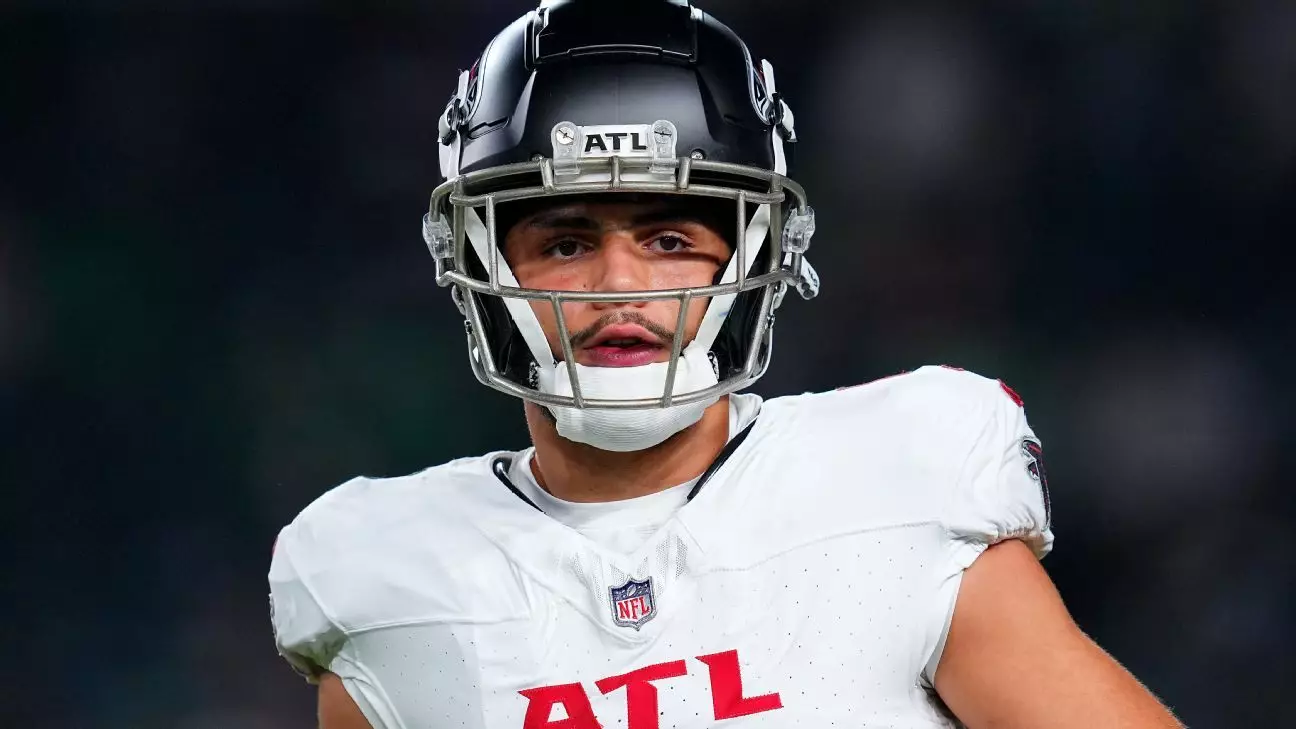In an exhilarating display of talent during Monday Night Football, Atlanta Falcons wide receiver Drake London marked his first touchdown in this high-stakes environment with a flair that would become a talking point for all the wrong reasons. The game against the Philadelphia Eagles showcased London’s athletic prowess when he caught a crucial 7-yard touchdown pass from quarterback Kirk Cousins, bringing the Falcons to a tie at 21-21 with just 34 seconds left. However, the ensuing celebration—an exuberant pantomime of shooting a gun into the air—sparked significant backlash, leading London to reflect on the implications of his actions in the days that followed.
Drake London’s celebration came at an unfortunate time, coinciding with a broader conversation surrounding gun violence in the United States—an issue that has recently hit close to home for the Falcons organization. The week preceding London’s significant moment saw the team inviting the Apalachee High School football team to their facilities, following a tragic shooting in the nearby community. London publicly expressed regret about how his celebration may have overshadowed the gravity of these circumstances, indicating that it was a moment of impulsive joy that failed to consider the serious context it emerged from.
On providing insights into his thoughts, London acknowledged, “I kind of lost myself in there,” underscoring that the thrill of the game had momentarily clouded his judgment. This statement resonates with many athletes who find themselves caught up in the emotional intensity of competition. In the world of sports, such driven moments often lead to emotional outbursts that, while celebrated in some circles, can have unintended fallout.
Coach Raheem Morris’s responses to London’s post-game regret further emphasize the collective responsibility shared within sports teams. Morris articulated that there is an underlying sensitivity required in today’s climate, especially following tragic events surrounding gun violence. He noted that the incident was a “mistake by all of us,” acknowledging that the team had unwittingly strayed into an area fraught with social implications.
Morris’s acknowledgment of the celebratory misstep places both the athlete and the organization in a unique light, where leadership must balance the need for self-expression against the backdrop of societal concerns. The team had donned Apalachee High School t-shirts during their warm-up prior to their Week 1 game against the Pittsburgh Steelers, signaling their supportive stance—a gesture that stands in stark contrast to London’s celebratory misfire. The juxtaposition of these actions underscores the nuanced challenges teams face in navigating modern societal issues within the realm of sports.
Learning from Mistakes: The Path Forward
Through this experience, both Drake London and the Atlanta Falcons have an opportunity to foster a greater understanding of the responsibilities athletes bear as public figures. London’s expressed remorse and commitment to avoiding celebratory actions that may mimic real-life violence is a crucial step towards repairing the narrative shaped by that moment. It illustrates the importance of reflection and growth—a narrative many young athletes can learn from.
In acknowledging the ramifications of his actions, London has not only taken ownership but has also incidentally sparked important dialogues surrounding celebration culture in sports, particularly in relation to real-world events. His statement that “you probably won’t see that again from me” carries weight—it is an implicit acknowledgment of his role in being a responsible athlete within a sensitive society.
Conclusion: Celebrating with Awareness
As the Atlanta Falcons navigate the footfalls of the season, the echo of Drake London’s controversial celebration serves as a powerful reminder that in the high-octane world of sports, as much as every moment is worth celebrating, there is an even greater need for awareness and sensitivity to our surroundings. The balance between expression and responsibility is delicate but crucial, signaling that athletes must compel themselves to think further than the scoreboards and the cheers. In doing so, they pave the way for a more enlightened path that positively influences both their sport and society as a whole.


Leave a Reply